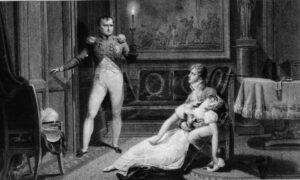Josephine: More than Meets the Eye
Though Josephine and Napoleon’s love story is famous, Josephine also played an important political role in solidifying Napoleon’s rule. First, Josephine’s warmth, grace, and charm provided the ruthlessly ambitious ruler with a much-needed public relations boost, both with the populace and Europe’s elite. Second, Josephine was well-connected within the French nobility and was able to fulfill Napoleon’s goal of bringing many of the discontented, but talented émigré nobility back to France. And third, on a more personal level, Josephine genuinely cared about Napoleon and provided him with a level of genuine personal support others could not, particularly as their relationship grew.
For most of this post, I am using a great biography about Josephine, The Rose of Martinique, as a reference.
Josephine’s Softened Napoleon’s Ruthless Image
Though Napoleon had secured the love of the French people through military successes in Italy and Egypt, he seized power by overthrowing the government with military force and double crossing his mentor and fellow conspirator, Paul Barras. After he seized power, he became no less ruthless, executing a French aristocrat without trail for aiding royalist forces. The aristocracy of Europe, and even some of Napoleon’s supporters, were shocked, with one remarking: “It is more than a crime; it is a political fault.”
Napoleon’s personality did not soften his image. He often lacked tact and seemed to enjoy being rude, once telling a female member of his staff, “‘Madame, I heard you were ugly, they did not exaggerate.”1
Besides his penchant for being offensive, Napoleon also had a violent temper. He once became so furious with Josephine for questioning him about an affair he was having that he “insulted her in every possible way, and smashed some of her furniture in his rage.”2
To offset some of the less savory aspects of his character, Napoleon needed Josephine. Whereas Napoleon felt out of place in among the French social elite, Josephine was in her element with them. She was the epitome of fashion and grace, playing the perfect host to many of the splendid events held by the First Consul and later, Emperor. During one such party an observer remarked:
“Mme Bonaparte was announced, and entered, leaning on the arm of Talleyrand. She wore a dress of white muslin with short sleeves, and a necklace of pearls. Her head was uncovered; and the beautiful braids of her hair, arranged with charming negligence, were held in place by a tortoiseshell comb. The flattering murmur which greeted her appearance was most gratifying to her; and never, I believe, did she display more grace and majesty.”3
While Napoleon could be harsh and tactless, Josephine displayed genuine warmth, going out of her way to compliment others and make them feel at ease. At one event, she was to officially give a little girl a bracelet in exchange for a bouquet. After the exchange, the girl innocently held out her other arm for another gift. Rather than being annoyed or flustered, Josephine naturally took off her own bracelet and gave it to the girl, a gesture that won her wild approval from the crowd.4
As such, Josephine played a significant role in ensuring Napoleon’s popularity. As Josephine biographer Andrea Stuart put it: “In the court and in the country her generosity and sweetness provided an essential counterbalance to Napoleon’s strong-man image. Without her his reign would be perceived as brutal rather than strong, intransigent rather than firm.”5
Josephine Convinced Many Émigré Nobility to Return to France
Besides bolstering Napoleon’s popularity, Josephine played a direct role in fulfilling Napoleon’s political aims. Throughout the revolution and during Napoleon’s rule as First Consul, many French aristocrats fled the country. Frightened, well connected, and powerful, they represented a dangerous challenge to Napoleon’s rule. Napoleon realized he needed to bring the émigrés back into the fold to establish security and make use of their talents for the good of the country.
If he outwardly made peace with the émigré nobility, however, he would be seen as betraying the initial goals of the revolution. And yet, if he continued to be harsh towards them, they would remain his enemies and continue to try to bring down his regime. Napoleon turned to Josephine to solve the issue. Josephine provided Napoleon an indirect avenue for forgiving the nobility without appearing contradictory to the populace. Already predisposed to advocating on behalf of nobles that left the country, Josephine eagerly set about fulfilling her husband’s wish. She received hundreds of letters and requests for meetings from the nobility, throwing the weight of her position behind bringing them back to France. Her support of these émigrés signaled to the others that it was likely safe to return home at last.
The ploy was so intentional and successful that one historian has called it “The Josephine Strategy.”6 Indeed, in 1801 alone over 40,000 émigrés returned to France. The return of the emigres, championed outwardly by Josephine and subtly by Napoleon, helped the country, in part, heal the divisions of the past and move forward under their new ruler.
Josephine Provided Napoleon with Personal Support
Napoleon’s relationship with Josephine began with an extremely rocky start. Napoleon was completely obsessed with Josephine, and yet, she almost certainly cheated on him early in their marriage. After the cheating incident and as Napoleon’s status grew, however, Josephine genuinely fell in love with Napoleon. Josephine provided Napoleon with love and support at a personal level that helped Napoleon manage the stresses of the empire. ‘Josephine possessed an exact knowledge of all the intricacies of my character’, Napoleon once remarked.7 She used that knowledge to calm him down, reassure him when he was doubtful, and bring him joy during his day. Indeed, one contemporary claimed Josephine’s “habitual gentleness gave him repose.”8
Perhaps the physical manifestation of Josephine’s love was Malmaison, the family’s manor house outside of Paris. Josephine revitalized the rundown estate, filling it with beautiful gardens, animals from around the world, and cozy rooms. Under Josephine’s care, Malmaison became the family’s true “home.” In it, Napoleon could find peace among the pleasure of being with his family amongst the quiet beauty of the estate. In fact, Napoleon enjoyed his time at Malmaison so much that a servant said he looked forward to his trips there like “a schoolboy looked forward to his holidays.”9
Uncomfortable among his powerful contemporaries, quick to anger, and weighed down by the burdens of acquired power, Napoleon leaned on Josephine for both emotional and physical refuge.
Conclusion
Though we may first think of Josephine as an object of desire that was able to captivate one of the most powerful people in the world, Josephine played a meaningful role in strengthening Napoleon’s rule. Without her warm-disposition, social finesse, and status among the nobility, Napoleon would have had a more difficult time winning over the populace—both the elites and common people—and bearing the stresses of power.
- Stuart, Andrea. The Rose of Martinique: A Life of Napoleon’s Josephine (p. 349). Grove Atlantic. Kindle Edition. ↩︎
- Stuart, Andrea. The Rose of Martinique: A Life of Napoleon’s Josephine (p. 319). Grove Atlantic. Kindle Edition. ↩︎
- Stuart, Andrea. The Rose of Martinique: A Life of Napoleon’s Josephine (p. 265). Grove Atlantic. Kindle Edition. ↩︎
- Stuart, Andrea. The Rose of Martinique: A Life of Napoleon’s Josephine (p. 304). Grove Atlantic. Kindle Edition. ↩︎
- Stuart, Andrea. The Rose of Martinique: A Life of Napoleon’s Josephine (p. 278). Grove Atlantic. Kindle Edition. ↩︎
- Stuart, Andrea. The Rose of Martinique: A Life of Napoleon’s Josephine (p. 280). Grove Atlantic. Kindle Edition. ↩︎
- Stuart, Andrea. The Rose of Martinique: A Life of Napoleon’s Josephine (p. 278). Grove Atlantic. Kindle Edition. ↩︎
- Stuart, Andrea. The Rose of Martinique: A Life of Napoleon’s Josephine (p. 278). Grove Atlantic. Kindle Edition. ↩︎
- Stuart, Andrea. The Rose of Martinique: A Life of Napoleon’s Josephine (p. 283). Grove Atlantic. Kindle Edition. ↩︎



